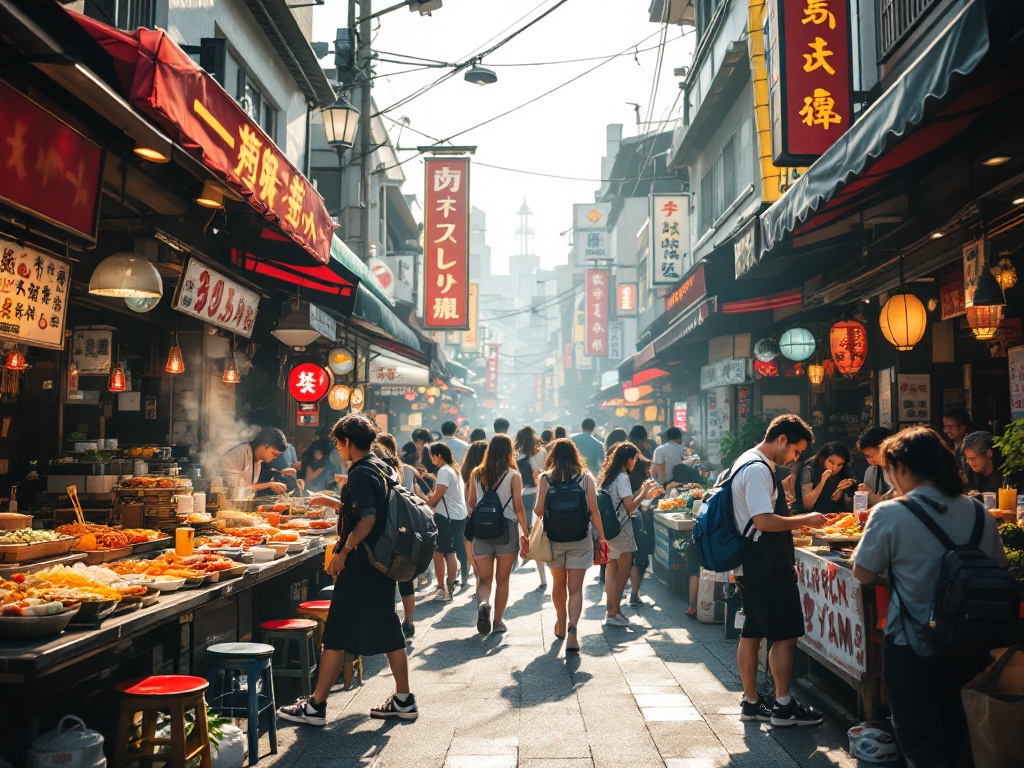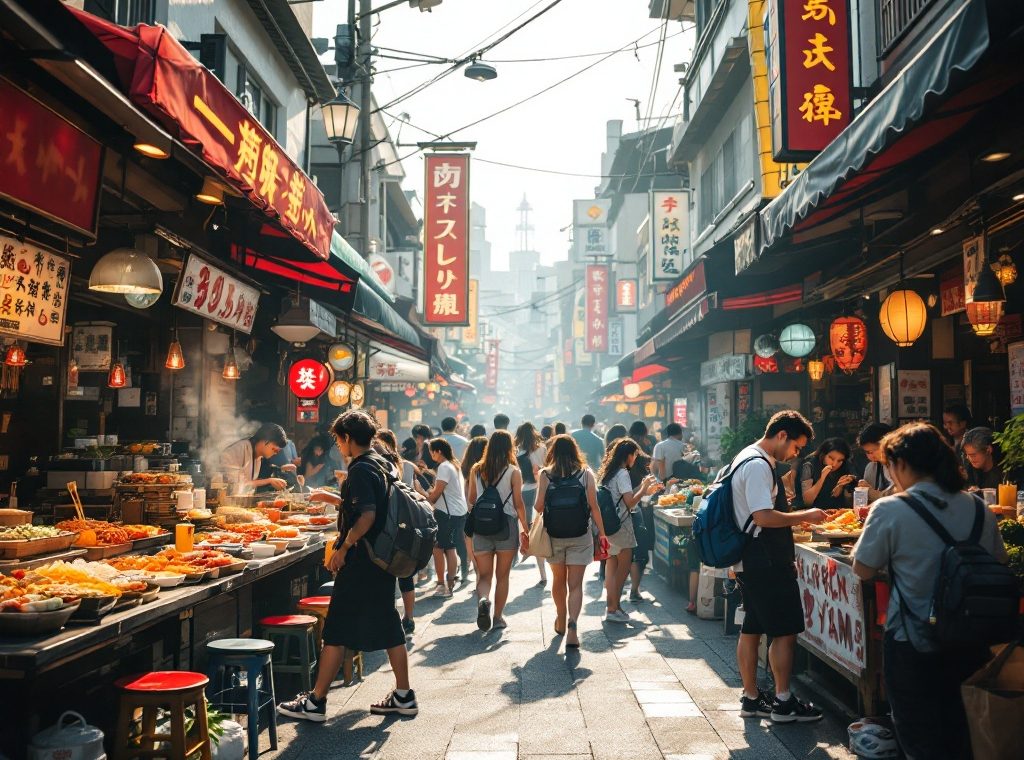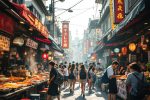How Much Is a Trip to Japan for 1 Week? A Complete Budget Breakdown
Dream of exploring Japan without breaking the bank? Discover how a one-week trip for two can cost as little as $2,066, covering accommodations, food, transport, and sightseeing! Uncover budget-friendly secrets, from $20/night hostels to delicious $7 street food meals. Learn how to maximize your yen with money-saving tips on transportation, attractions, and even souvenirs. Start planning your unforgettable Japanese adventure today!
Important information

- A one-week trip to Japan for two averages around $2,066, covering accommodation, food, local transport, and sightseeing. Costs can range from $1,200 (budget) to $3,000 (mid-range).
- Accommodation varies widely. Budget travelers can find hostels or capsule hotels from $20/night, while luxury hotels and Ryokans can exceed $500/night. Booking in advance is recommended, especially during peak season.
- Daily food costs range from $35 to $55 per person. Save money by leveraging convenience stores, lunch specials, and street food (often under $7).
- For transport, consider a 7-day Japan Rail Pass ($275) for extensive Shinkansen (bullet train) travel. Local subways and buses cost $5-$15 per day. Walking and cycling are good options for short distances.
- Sightseeing costs vary. Many temples, parks, and local neighborhoods are free. Paid attractions typically charge between $3.50 and $13. Consider multi-attraction passes for additional savings.
Understanding the Cost of a One Week Trip to Japan
Plan a fantastic one-week trip to Japan for two for approximately $2,066 (¥303,604). This price generally covers accommodations, food, local transportation, and sightseeing. While this average serves as a useful benchmark, actual costs can range from $1,200 to $3,000, depending on individual travel preferences. Budget travelers can comfortably explore Japan for $50 to $100 per day. For a more mid-range experience, a daily budget of $150 to $250 is recommended.
Overview of Average Costs
A budget-minded trip to Japan will cost around $58 per day.
For a more comfortable mid-range experience, expect to spend closer to $148 daily.
Luxury travelers, however, should budget around $375 a day for high-end accommodations and experiences.
Estimated Total Cost Range for a Week
Planning a week-long trip to Japan? A trip like this typically costs between $1,200 and $3,000, covering expenses such as flights, accommodation, food, transportation, and activities. For budget travelers, exploring Japan is possible for around $50 to $100 per day. If you are looking for more comfort and convenience, expect to spend around $150 to $250 per day. Luxury travelers should anticipate significantly higher costs.
Accommodation Costs in Japan
Japan offers accommodation options for every budget, from budget-friendly hostels to luxurious Ryokans. Travelers on a tight budget can find hostels and capsule hotels starting at $20 per night. For a more comfortable stay, mid-range hotels typically cost between $100 and $250 per night. Luxury travelers can indulge in high-end hotels and traditional Ryokans, which can cost upwards of $500, especially during peak season.A week-long trip to Japan can cost anywhere from $140 for the most budget-conscious travelers to over $3500 for those seeking a luxurious experience. For a moderate level of comfort, budget around $100 to $200 (AUD) per day. Even during peak seasons, which typically have higher prices, guesthouses and private hostel rooms can be found for around $80 to $90 (AUD).
Budget Accommodation
- hostels and capsule hotels from $20,
- guesthouses and private hostel rooms for around $80 to $90 (AUD).
Luxury Accommodation
- high-end hotels and traditional Ryokans upwards of $500.
Consider hostels, capsule hotels, or guesthouses for budget-friendly alternatives.
Book accommodations in advance, especially during peak travel times, to secure the best deals.
Choose accommodations with free cancellation for added flexibility.
Explore areas outside major tourist hubs for potentially lower prices.
Look into options like Couchsurfing or WorkAway for cost-effective and culturally immersive experiences.
Average Prices for Different Travel Styles
Looking for budget-friendly accommodation? Hostels and capsule hotels offer comfortable stays for approximately $25-40 per night. If you prefer more amenities, consider mid-range hotels, typically priced between $80 and $150 per night. For a luxurious experience, high-end hotels and resorts are the ideal choice, with rates starting at $200 and often exceeding $500. Remember that the location significantly impacts the price.
Budget
hostels and capsule hotels, approximately $25-40 per night.
Mid-range
$80-150 per night.
Luxury
high-end hotels and resorts, starting at $200 and often exceeding $500.
Money-Saving Tips for Accommodation
Traveling to Japan on a budget is entirely possible. For affordable lodging, consider hostels, capsule hotels, or guesthouses. Booking accommodations in advance, especially during peak seasons, can often secure lower rates. Websites like Booking.com and Agoda offer free cancellation options for flexibility. For a cultural exchange, explore cost-effective platforms like Couchsurfing or WorkAway. Venturing beyond popular tourist spots can also reveal cheaper accommodations in less-traveled areas.
Budget-Friendly Accommodation
- hostels,
- capsule hotels,
- guesthouses.
Booking Tips
- Book in advance, especially during peak season,
- Use websites like Booking.com and Agoda for free cancellation options,
- Explore less-traveled areas for cheaper options.
Cultural Exchange Platforms
- Couchsurfing,
- WorkAway.
Food Expenses in Japan
Planning your food budget for a trip to Japan? Expect to spend approximately $35 to $55 per person daily. Here’s a general price breakdown:
Breakfast
Typically costs between $9 and $15.
Lunch
Slightly pricier, ranging from $8 to $26.
Dinner
The most expensive meal, averaging $18 to $41.
Looking to save money? Here are some tips:
- Seek out lunch specials at local eateries, they often offer great value.
- Explore street food for a delicious and budget-friendly cultural experience.
- Utilize convenience stores for quick, affordable snacks and meals.
- If your accommodation has a kitchen, preparing some meals can significantly cut down on dining costs.
Average Daily Food Budget
Eating in Japan offers a range of options from budget-friendly to extravagant, costing between $35 and $55 per person daily. Combining convenience store meals, affordable restaurants, and occasional splurges is entirely possible. On average, budget around $51 (¥7,530) per day.
Estimated Meal Costs
- Breakfast: $9 to $15.
- Lunch: $8 to $26.
- Dinner: $18 to $41.
Tips for Saving
Local restaurants often have better lunch deals than dinner. Exploring street food offers an authentic and budget-friendly experience.
For two people, food and drinks average around AUD $116 per day, about 35% of a typical daily budget. Budget travelers can manage on $10 to $15 per person daily by utilizing convenience stores and casual eateries. A mid-range dining experience requires a budget of $20 to $50 daily, while fine dining can exceed $100. Street food offers authentic flavors at low prices, with many dishes like sushi, ramen, and local specialties under $7. In contrast, a traditional kaiseki dinner is a more formal and expensive experience. Japanese convenience stores are a great resource for affordable meals and snacks throughout your trip.
Budget-Friendly Dining Options
Eating in Japan can be surprisingly affordable. Budget-friendly options are widely available, from convenience stores and bustling street food stalls to local restaurants, with meals often under $7. Imagine enjoying sushi, ramen, or tempting street snacks without breaking the bank. A week’s food expenses can range from $105 to $210, depending on your dining choices.
Budget-Friendly Bites
Convenience store meals offer the most economical choice, often under $7.
Mid-Range Meals
Casual eateries and street food vendors provide delicious meals typically priced between $3 and $20.
Transportation Costs in Japan
Traveling around Japan by train and bus offers a budget-friendly way to explore the country. Daily travel expenses average around $19. Multi-day passes offer even greater savings for frequent travelers. For long-distance train travel, especially on the shinkansen (bullet train), consider the Japan Rail Pass, priced at approximately $275 for a 7-day pass, providing unlimited travel. Local subways and buses are another convenient option, typically costing between $5 and $15 per day.
Average Transportation Costs
The average visitor spends about $55 daily on transportation, including both intercity and local travel. Public transport is the most common choice, especially in urban areas.
- Daily travel: $19,
- Local subways and buses: $5-$15 per day,
- Shorter trips within cities: $5-$10 per day.
Weekly and Individual Ticket Costs
A weekly transport budget can vary from $10.50 to $35, depending on travel frequency and pass usage. Individual train tickets range from $5 to $70, depending on the distance.
- Weekly budget: $10.50-$35,
- Individual train tickets: $5-$70.
Step 1: Consider the Japan Rail Pass
If you plan extensive train travel, especially on the shinkansen, the Japan Rail Pass offers excellent value.
Step 2: Utilize Local Transit Systems
For shorter trips, consider local transit systems like subways and buses, which provide efficient and affordable travel within cities. Buses can often be a cheaper alternative to trains, sometimes costing half the price.
Step 3: Embrace Walking and Cycling
To maximize your budget and enjoy the local scenery, consider walking or cycling, especially for shorter distances.
Local Transportation: Public Transportation and JR Pass
Traveling within Japan is easy thanks to its comprehensive public transport system. For long-distance travel, consider the Japan Rail Pass, a cost-effective option for international visitors. A 7-day pass costs $275. Daily local travel expenses usually range from $5 to $15. Your weekly transport budget in Japan could be between $50 and $300 depending on your travel plans and mode of transport. Individual subway or bus rides typically cost between ¥200 and ¥500, while bullet train journeys can cost anywhere from ¥10,000 to over ¥20,000.
Average Daily Transportation Expenses
Planning a trip to Japan? Budget roughly $55 per day for transportation, covering local commutes and the occasional taxi. Public transport offers excellent intercity connections, with plentiful and affordable trains and buses. For longer journeys across multiple cities, consider the Japan Rail Pass, although recent price increases mean comparing it with individual tickets is advisable.
Train travel
Individual train tickets typically cost between $5 and $70, depending on the distance.
Bus travel
Buses provide a more economical option, often half the price of a train.
For getting around within a city, allocate about $19 a day. Frequent local travelers can save substantially with multi-day passes.
Tips for Saving on Transportation
For extended journeys throughout Japan, the Japan Rail Pass offers significant savings. For navigating local transit, such as subways and buses, an IC card offers unparalleled convenience. To discover hidden gems at your own pace, consider exploring nearby destinations on foot or by bicycle.
Activities and Sightseeing Expenses
Japan offers a variety of attractions for every budget. Many temples and parks are affordable, costing between $5 and $10. Popular destinations like theme parks typically range from $50 to $100. Cultural experiences, such as tea ceremonies or guided tours, also vary, costing anywhere from $30 to $100. Fortunately, budget-friendly options are plentiful. Exploring local neighborhoods, public parks, and many temples are often free. Numerous attractions have entrance fees between $3.50 and $7 (¥500 to ¥1,000). To save even more, consider planning your trip around free events or utilizing multi-attraction passes. Experiencing Japan’s rich culture doesn’t have to be expensive.
Affordable Attractions
- Many temples and parks: $5 – $10.
- Free options: Local neighborhoods, public parks, and temples.
- Numerous attractions: $3.50 – $7 (¥500 – ¥1,000).
Costlier Experiences
- Theme parks: $50 – $100.
- Cultural experiences (tea ceremonies, guided tours): $30 – $100.
Tip: Plan your trip around free events or use multi-attraction passes for extra savings.
Entrance Fees for Popular Tourist Attractions
Exploring Japan’s must-see destinations is surprisingly budget-friendly. Entrance fees are typically quite low, averaging just $2 per person each day. Many popular spots, like Sensō-ji Temple and Ueno Park, are even free. While some attractions, such as the Tokyo National Museum or the Ghibli Museum, do charge a fee (generally between $3 and $13), it’s easy to incorporate these costs into your travel budget.
Free and Low-Cost Activities in Japan
Explore Tokyo on a Budget:Free and Affordable Attractions:
Parks and Gardens
- Find tranquility amidst the bustling city at Ueno Park, a large public park with museums, a zoo, and a pond.
- Stroll through Shinjuku Gyoen National Garden, a beautiful oasis blending Japanese, English, and French landscape styles.
Temples and Shrines
- Visit Senso-ji Temple, Tokyo’s oldest temple, known for its vibrant Kaminarimon Gate and Nakamise-dori market.
- Experience the peaceful atmosphere of Meiji Jingu Shrine, dedicated to Emperor Meiji and Empress Shoken.
- Hike the scenic trail at Fushimi Inari Shrine, famed for its thousands of vibrant red torii gates.
Cultural Experiences:
Immerse yourself in Tokyo’s vibrant culture by attending local festivals and street performances. Many of these events are free or very affordable, offering a unique glimpse into Japanese traditions and art forms. Delve into art and history at numerous museums for just ¥500-¥2000, experiencing world-class exhibitions without breaking the bank.
Foodie Delights:
Savor the flavors of Tokyo at bustling local markets. Indulge in delicious and inexpensive street food, a true culinary adventure for budget-conscious travelers. Experience the authentic tastes of Japan without emptying your wallet.
Miscellaneous and Entertainment Costs
Your souvenir spending is entirely up to you. Daily entertainment and nightlife can range from $15 to $30 per person. For incidentals like souvenirs, snacks, or unforeseen expenses, a budget of $100 to $200 should suffice. Don’t forget to factor in additional costs such as Wi-Fi rental, airport transfers, and travel insurance.
Souvenirs and Shopping
Plan to spend roughly $13 a day on souvenirs and fun finds, like small gifts and snacks. It’s a good idea to bring a little extra cash, though, because you’ll discover plenty of unique items in Japanese shops and might be tempted to splurge.
Entertainment and Nightlife Costs
Experience Japan’s vibrant nightlife, catering to diverse budgets and preferences. A typical evening’s entertainment can cost between $15 and $30 per person. For an authentic local experience, explore izakayas (Japanese pubs), offering an affordable and lively atmosphere. For a more extravagant evening, consider upscale clubs and live music venues. Including drinks, the average nightlife spend is around $16 per day. In bustling cities like Tokyo and Osaka, discover diverse entertainment options ranging from karaoke to a wide array of izakayas. To manage your budget effectively, consider moderating your alcohol consumption.
Currency Exchange and Budgeting
Planning a trip to Japan? Understanding the yen-to-dollar exchange rate is crucial for your budget. The official currency of Japan is the yen (JPY). Knowing its value against the dollar will significantly impact your spending.
Before your trip, research the current exchange rate. Online converters and your local bank offer up-to-date information.
Remember that exchange rates fluctuate. Monitor the yen-to-dollar rate before and during your trip to manage your expenses effectively.
Understanding the Exchange Rate: Yen to Dollar
Understanding the current yen-dollar exchange rate is crucial for your travel budget to Japan. This will allow you to make smarter financial decisions and maximize your spending power. For the most up-to-date information, use currency converter websites and apps that provide real-time updates. Stay informed to spend wisely.
Money-Saving Tips for Your Japan Trip
Stretch your yen further on your Japanese adventure! Target spring or autumn for travel to find better deals on flights and accommodation. Consider budget-friendly options like hostels, capsule hotels, or guesthouses. If you plan extensive train journeys, a Japan Rail Pass is a smart investment. For local travel, utilize the affordable subway and bus systems. Explore numerous free activities, such as visiting parks, temples, and vibrant local neighborhoods. Eating affordably is easy too. Grab convenient and cheap meals from convenience stores, take advantage of restaurant lunch specials, or savor a delicious bowl of ramen. Seek out free or discounted attractions, and consider a city pass for multiple attractions. To keep souvenir and snack spending in check, set a daily budget. Here’s how to make your money go further:
Travel Smart
- Travel during spring or autumn for better deals on flights and accommodation.
- Choose budget-friendly accommodation: hostels, capsule hotels, guesthouses.
- Invest in a Japan Rail Pass for extensive train travel.
- Utilize affordable subway and bus systems for local transport.
Free and Affordable Activities
- Explore free activities: parks, temples, local neighborhoods.
- Eat affordably: convenience store meals, restaurant lunch specials, ramen.
- Find free or discounted attractions.
- Consider a city pass for multiple attractions.
- Set a daily budget for souvenirs and snacks.
Cheap Flights and Travel Insurance
Planning a trip within Japan on a budget? Consider these tips for affordable travel:
Budget Airlines
Several budget airlines offer competitive fares within Japan:
- Peach Aviation,
- Jetstar Japan,
- Spring Airlines Japan.
Travel Insurance
Protect your trip with travel insurance from reputable providers:
- World Nomads,
- SafetyWing,
- Allianz Travel Insurance.
Compare coverage options to find the best value for your needs.
Look for discounts and bundle deals to maximize your savings.

















